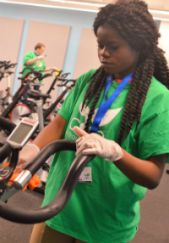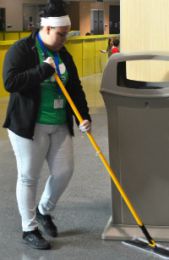It’s precisely 8 a.m.on a recent Monday, and the team meeting of the Kent Transition Center CORE program is right on time inside classroom space at the Mary Free Bed YMCA on Grand Rapids’ Southeast Side.

Group members are being quizzed on a field trip to Meijer the previous week, challenged to recall terms such as UPC codes, shelf facing and the importance of smiles and eye contact in customer service. Responses are quick, correct and complete, which has program Director Michael Spagnuolo pretty excited.
“Yes! Home runs all day long!” he cheers to the group of 15 students with cognitive or other impairments from districts across Kent ISD’s service area. (Kent Transition Center and CORE are programs of Kent ISD, serving students across the region.)
Next, CORE members grab their cleaning supplies and fan out in small groups inside the 116,000 square-foot health and fitness club. “I’m a perfectionist, so I like everything to shine,” offers Lowell High School student Emily Grochowalski.
More than merely making the place sparkle, CORE members are gaining experience aimed at preparing them for adulthood, whether that’s living independently, working or volunteering in the community, or all of the above.
“These are all transferrable skills that they are going to take out into to world and the workplace,” said Susan Balas, KTC career and technical education specialist. “The biggest thing I have seen already is the confidence that is being built. Once that happens, everything else comes into place.”

Perfect Partnership
Creating a space inside an area business to partner with KTC is a process that began nearly a year ago, when KTC upped its requirements for participation in its high school occupational training and career exploration programs. That left some students who who couldn’t reach those requirements out of the loop for workplace training. Special Education directors asked KTC for help creating a program for these students.
The Mary Free Bed YMCA, developed in partnership with the Mary Free Bed Guild of Mary Free Bed Rehabilitation Hospital, was ideally suited to the need, officials said.
“When we came to the YMCA, their philosophy of inclusion along with Mary Free Bed’s vision of opportunity for everyone, it was the perfect match,” said Duane Kiley, KTC director. “It is a great site that offers lots of potential in giving students training that will make them successful in any career. It focuses heavily on those soft skills that make or break an employee in any job.”
The goal of the five-day-a-week, yearlong program is to prepare students with special needs for life after high school. That could be with the help of a program like Michigan Rehabilitation Services, a community program, or through a Kent ISD partnership with area employers.
“They do a phenomenal job,” explained Nicole Hansen, executive director of YMCA Activate. “Our partnership with KTC CORE really brings to life the vision and mission of this branch of the Y.”

Exceeding Expectations
Heather Sneider, Lowell Area Schools Special Education department chairwoman, said the district “had sort of exhausted what we had at the local level for work-based experiences.”
The KTC CORE program “has turned out to be wonderful” for the four students who currently attend, she said. They are learning to take risks, show initiative and embrace new environments.
“And you can see the crossover positive impact when they come back to the classroom,” she added. “We’re seeing harder work, better focus and more advocating for themselves.”
Emily said CORE is getting her ready not only for a job, but job interviews. Her biggest strengths as an employee: She enjoys working with people and she’s a thorough cleaner, she said. Where she needs work: “Maybe speed, but that’s normal for everybody.”
“I can actually see myself working here,” Emily said of the Y.

Her favorite job so far? Greeting members at the front desk. “I really like talking to people.”
Spagnuolo said interaction with new people and learning to work as a team is a big component of the KTC CORE experience, from how to shake hands properly to how to ask for help and to speak up when you have a suggestion.
Even just two months in, he said the gains he is seeing have exceeded expectations.
“I’ve been working in special education for 16 years and I’ve never seen this outcome,” Spagnuolo said. “I have teachers, parents saying to me ‘I don’t know what you’re doing, but…’ They are witnessing transformations in students who just a short time ago walked in here with their heads down, who wouldn’t talk to anyone, who are now on their way to go right out the door and immediately apply for jobs.
“That’s the most powerful piece to me.”
CONNECT









